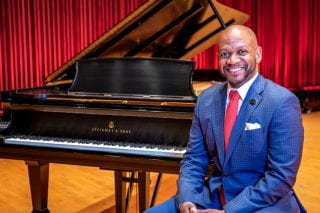Spotlight On: A Grammy-Winning Educator Who Understands the Power of Music
It’s a bit of an unusual day in Jeffrey Murdock’s music education class. After waiting in the lobby of the Epley Band Hall on the University of Arkansas campus, masks on, for the room to be cleaned after the previous class, students file into the cavernous practice space and take their seats behind music stands with “UA BANDS” stenciled on them in capital letters. They’re here to learn how to teach music, not play it, so there are no instruments in their hands.
Murdock, associate professor of music education at the University of Arkansas, is at the front of the room, sharply dressed in a brown tweed jacket, blue slacks, black bow tie and a red face mask to match his red vest. To his right is a CBS camera crew from Dallas recording the lecture. The students know half the reason the camera crew is there: Murdock is a nominee for the 2021 Grammy Music Educator award. The other half of the story is that he’s already won, but that news had yet to be announced this day.
The lecture topic is “culturally responsive pedagogy in the chorale classroom,” the idea of meeting students where they are to better shape where they’re going. It’s a lived lesson for Murdock. He grew up in a rough part of Biloxi, Mississippi, where “It was not uncommon to see people shot and killed in front of my house,” he told a CBS interviewer later that day. “I appreciate the village that was around me that helped me overcome those odds.”
That is part of what lead him to teaching – and his philosophy that in teaching you meet students where they are, not where you wish they were. That is wisdom he imparts on his students – future music teachers. And part of the reason the Recording Academy and Grammy Museum selected Murdock at the 2021 recipient of the prestigious Grammy Music Educator Award.
CBS announced his Grammy win March 11. The award recognizes current educators who have made a significant and lasting contribution to the field of music education and who demonstrate a commitment to the broader cause of maintaining music education in the schools. It includes a $10,000 honorarium and a matching grant to the university’s music program.
Murdock is a 2016 Connor Endowed Faculty Fellow in the Fulbright College of Arts and Sciences, where he is an associate professor of music education. In addition to teaching, he’s the associate director of choral activities, and conducts the Inspirational Chorale and Razorback Chorus. He is a 2018 Golden Tusk Awardee, which recognizes faculty who go above and beyond for students, and a 2019 Faculty Member of the Year.
That piano teacher, along with a middle school choir director, demonstrated that music was a viable path. He credits them still, by name.
“Starting with my piano teacher, Bernard McDaniel, and my middle school choir director, Felicia Cooper, they were kind of the first people who showed me that music education can be done by black males and females, and so that was inspiring to me early on. I carry a piece of all my choir and band directors with me in everything I do.”
As a high school teacher, Murdock joined the Mississippi Boulevard Christian Church in Memphis, Tenn., soaking up rich gospel traditions and an informal music education. “Leo Davis, the minister, taught me so much about musicianship and musicality. And though he was never a teacher, I think I learned so much about musical processes and taking what I had to the next level from him.”
He continued his formal training, earning a bachelor’s of music education and a master’s of music in choral conducting from the University of Southern Mississippi, and his PhD in music education from the University of Memphis. He came to the University of Arkansas in 2015.
Murdock’s is a success story, but he doesn’t tell it that way. For him the story still centers on the classroom, and the influence a teacher can have on a life’s trajectory.
“I’ve oftentimes seen students come in who were struggling in other subjects, struggling in school, struggling in life, struggling in various areas, and they come into a music class and music changes them,” he said. “I’ve had the pleasure of teaching many of those students who have come to me and said, ‘You know, I would have dropped out of school if it weren’t for music and music education.’”
A version of this story also appeared in the University of Arkansas’ Arkansas Research publication.


